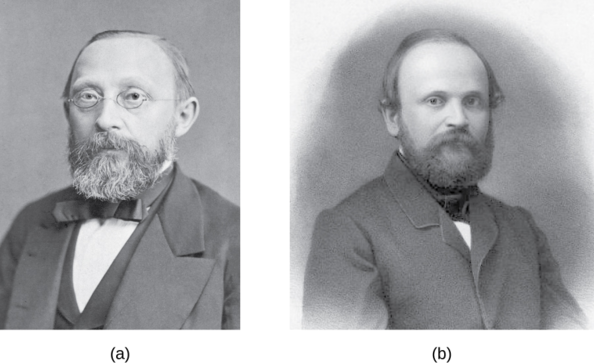Facing Marginalization:
Robert Remak's Journey
Prior to 1812, Jews in Prussia, like many parts of Europe, faced extensive discrimination in the form of legal, educational and economic restrictions, as well as religious persecution and social exclusion. Jews were barred from academic fields connected to guilds, which led Jewish academics to focus on fields such as mathematics and medicine (Kampe and Schmiedebach 1989; Lachenicht 2009).
In March of 1812, the Emancipation Edict was passed, granting Jews certain rights in Prussia, such as the ability to work as craftsmen, being recognized citizens of the state, and freedom of residence (Lohmann and Mayer 2007; Skolnik and Berenbaum 2007). However, there were still policies and larger societal behaviours that reinforced Jewish exclusion. Central to continued Jewish discrimination was the German concept of Bildung. This idea emphasized the adoption of Christian values in order for Jews to be socially accepted (Lohmann and Mayer 2007). This was reflected in legislation demanding mandatory Christian instruction at schools and the banning of Jewish teachers from instructing Christian students. Jews also faced restrictions on appointment to higher positions, particularly those of civil duty due to stereotypes that Jews could not uphold the ethical standards of Christians.
This discrimination not only prohibited Jewish scientists from becoming full professors but also forced many to navigate a complex academic landscape where their professional identities were often defined by their outsider status instead of their scientific contributions (Volkov 2001). Remak was only a lecturer (Privatdozent) at the time, a position that was unpaid and of lower title than a full professor. It wasn’t until 1859, sixteen years after he first applied to the university, where, after years of rejections and appeals to King Friedrich Wilhelm IV, he was given royal approval for the role of Extraordinarius professor (Kampe and Schmiedebach 1989; Zeidman 2020). This was however still below the title of Ordinarius professor and was also an unpaid position (Kampe and Schmiedebach 1989; Zeidman 2020). Non-Jewish colleagues were granted their professorship based on their significant scientific qualifications and experience alone, however, Remak’s Jewish identity was brought up in nearly every discussion concerning his promotion (Kampe and Schmiedebach 1989).
Jewish Stereotypes
Stereotypes, such as those shown below, existed long before Remak applied for a university teaching position and could have influenced the prejudice and discrimination that continuously stalled his professional progress (USHMM [date unknown]a, [date unknown]b; Sorkin 1999). Even though the Emancipation Edict had been passed, it would take many decades to transform the public's perception of Jewish citizens.
Fear of Competition
Jewish people were trying to take influential jobs (such as teaching at universities) away from non-Jews
Economic Distrust
Jewish people wanted full citizenship rights to put money in their own hands rather than to help build the nation’s wealth
Skepticism of Conversion
Jewish people were insincere if they converted to Christianity to gain material benefits
Pressure to Convert
Even after the Emancipation Edict of 1812, the King of Prussia promoted conversion to Christianity and prohibited conversion to Judaism (Skolnik and Berenbaum 2007). While there was no legal obligation for Jews to convert from Judaism during Remak’s professional life, there were certain privileges granted to those who were baptized. This led 1,371 Jews to convert between 1812-1846 (Skolnik and Berenbaum 2007). Such privileges allowed them to hold positions in state service, the military, and certain positions in academia (USHMM [date unknown]a).
A professor of history at the University of Berlin (1810-1820) stated that Jews who did not convert should have their rights restricted and would simply be a “tolerated people” in the Christian State of Germany (Sorkin 1999). Less than half a decade after this comment, Remak would plead his case to the King himself in order to lecture at the University of Berlin (Kampe and Schmiedebach 1989). Despite years of rejections, Remak adamantly refused to convert in order to gain more-esteemed and well paid teaching positions at the university (Kampe and Schmiedebach 1989; Sorkin 1999). Remak is thought to be one of the first non-baptized Jewish university professors in Germany (Charpa and Deichmann 2007).
Subtle Antisemitism - Remak and Virchow
A nuanced example of the antisemitism present in 19th century Prussia can be seen in Remak’s encounters with Rudolf Virchow. Virchow spoke and acted politically to support the Jewish population, but was prone to falling back on antisemitic tendencies when competing with Remak for positions or scientific acclaim (Kampe and Schmiedebach 1989; Zimmerman 1999). While interviewing for the chair of a university’s pathological anatomy department, Virchow consistently brought up Remak’s Jewish heritage during discussions (Kampe and Schmiedebach 1989). Virchow ended up being appointed as the chair, with Remak following in second despite the committee's acknowledgement of his scientific gifts (Kampe and Schmiedebach 1989).
Remak was the first to publish the principle that all cells arise only from preexisting cells in 1858 (Remak 1858). Virchow expressed the same statement later that year with no mention of Remak, sparking a good deal of hostility between the two researchers (Kampe and Schmiedebach 1989; Zeidman 2020). The two worked in the same department at the time of Virchow's publication, and Virchow even made reference to Remak’s 1858 paper in another section of his book (Virchow 1858). These circumstances have prompted suspicions that Virchow plagiarized Remak’s idea of omnis cellula e cellula. Remak’s explanation was considered more thorough and was clearly built on years worth of observations, yet the idea only gained attention after Virchow’s publication. To this day, most non-historians and textbooks still credit Virchow with formulating the third tenet of cell theory (Baker 1953).

Exclusion in Textbooks
During our research, we observed that the following textbooks, among others, solely mention Virchow when discussing the formulation of the third tenet of cell theory. It is important to note some textbooks in Germany have started to recognize Remak and his contributions to science.



